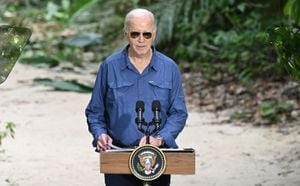Countries around the world gathered for COP29, the 29th United Nations Conference of the Parties on climate change, held in Baku, Azerbaijan, where negotiations are heating up over climate finance. A major focus is on how much money wealthy nations should provide to poorer countries to mitigate the effects of climate change. The situation is complicated; developing nations are calling for upwards of $1 trillion annually, far beyond the prior commitment of $100 billion set over a decade ago.
This summit marks another iteration of discussions around climate finance, highlighting the stark realities many nations face as climate impacts escalate. Global emissions continue to rise, and the recent G20 summit exacerbated tensions, with conflicting interests making consensus hard to come by. The urgent need for increased funding to bolster climate resilience has put pressure on rich countries, which are historically responsible for the majority of greenhouse gas emissions.
Delegates at the climate summit are engaged in heated discussions about whether the funding should take the form of grants—money organizations do not have to pay back—or loans, which send many developing countries spiraling under debt. This argument reflects broader tensions, with poorer nations contending they need clear and accessible pathways to secure funds to tackle climate disasters directly affecting them.
The historical promise of rich countries to contribute $100 billion annually by 2020 was significantly delayed, with the target being met only belatedly two years later. Critics argue this figure was merely political—comfortable for advanced economies but nowhere near adequate for developing nations facing mounting climate crises from floods and droughts to biodiversity loss and rising sea levels. "It's not charity; it's about justice," says Ani Dasgupta of the World Resources Institute.
Climate negotiations at COP29 have encountered harsh realities, with many developing nations like India, China, and Brazil stating they are ready to contribute their fair share but only if industrialized nations do the same. The consensus aims to establish the structure of contributions and delineate responsibilities among nations. There appears to be progress, with discussions revolving around the idea of voluntary contributions, though underlying issues remain unresolved.
Another point of contention has been the transparency and accessibility of those fund allocations. Reports from several organizations reveal only 0.8% of climate finance reported goes to grassroots organizations within the Global South, meaning the funds are primarily channeled to larger, often Western-based NGOs. This exacerbates the divide because smaller, local organizations are best positioned to mobilize resources and implement solutions effectively.
"We see the systemic barriers preventing local communities—especially women and marginalized groups—from accessing these funds," highlights Fati N'zi-Hassane of Oxfam. She notes the complex application processes, which often require professional expertise and extensive documentation, effectively sidelining the communities most affected by climate impacts.
The spotlight was also on the G20, comprising the world’s top economies responsible for the majority of global emissions. These countries are not only significant players but also possess the resources needed to make impactful changes. Leadership from these nations is absolutely necessary, according to UN Secretary General António Guterres, who emphasized, "Now is the time for leadership by example from the world’s largest economies and emitters." The pressure is on G20 leaders to steer substantial dialogue on climate financing.
Within the tumult of COP29 is the looming shadow of Donald Trump’s return to power, urging many environmental advocates to raise their alarms. His administration previously downplayed climate change significantly and pulled the United States out of the Paris Agreement. Even now, Trump's potential influence threatens to destabilize fragile progress made at international climate talks, particularly those relating to finance commitments.
Joseph Thwaites from the Natural Resources Defense Council points out the urgency for negotiations to culminate on financial commitments. He asserts, "We need to establish financial goals linked to developing countries’ needs because without this alignment, the climate crisis will deepen, jeopardizing countless lives and ecosystems."
Several economists back the developing countries' proposed target of $1 trillion per year, arguing it is realistic and necessary. Looking toward climate goals beyond this summit, many are hopeful the anticipated discussions this week will yield concrete agreements paving the way for future climate resilience. Nonetheless, the lack of consensus about defining shared financial responsibilities continues to hang heavily over COP29's proceedings.
The task at hand is pivotal. COP29 could set the tone not just for the current decade but for subsequent climate negotiations. This precarious situation hinges on whether negotiators can grapple with the terms of climate finance, ensuring equity and accessibility are at the forefront of their conclusions. The stakes have never been higher, and the clock is ticking. If the nations of the world cannot come together to address climate finance swiftly, the damage from climate change could become catastrophic and irreversible.
For many developing countries, these talks are not just about international policy; they are about survival. Without adequate climate finance, they risk falling behind on their aspirations to cut emissions and provide sustainable solutions to their communities impacted by climate disasters. The call for justice echoes loudly within these halls, and it’s evident—action must follow words.
So, as COP29 continues, all eyes remain fixed not just on the financing figures discussed but on whether these discussions will result in actionable commitments. Optimism is needed, but so too is clarity of purpose. The outcomes must go beyond mere acknowledgments and aspirations; real change is on the line, and every moment counts. Each day's progress is measured not just on paper but reflects the urgent realities faced by those on the climate frontlines.



